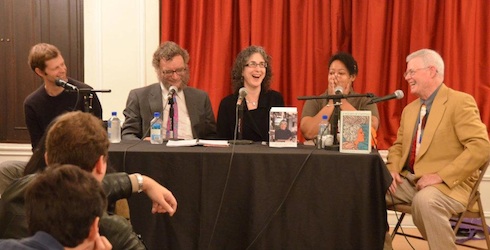Only a brainwashed alien from a dimension in which creativity didn’t exist would be unaware that Ursula K. Le Guin is a prolific badass of a writer. But did she literally change both the fields of science fiction and fantasy forever? Last night at The Center for Fiction, a stellar panel discussed the influences of Ursula K. Le Guin and one assertion was particularly interesting; the possibility that Le Guin was one of the best science fiction writers of the latter-half of the 20th century not only because of her innovation, but also because of her plurality.
The panel was moderated by Tor Books’s very own David Hartwell, and consisted of Michael Swanwick, N.K. Jemisin, Ellen Kushner, and John Wray. Of everyone involved, Wray was the only author not specifically a science fiction or fantasy writer, though totally has a deep love, respect, and knowledge of the genre. Both he and Ellen Kushner briefly touched on the notion of NOT writing books and stories in the style of one’s literary heroes, (like Le Guin) before getting into the expansive discussion of Le Guin as undeniable influence on the genre fields. Here, Swanwick asserted that trying to measure Le Guin’s importance to the field was like trying to figure out “what salt means to the sea.” Hartwell mentioned that the Encyclopedia of Science Fiction considers Le Guin to be one of the best SF writers of the latter 20th century. Hartwell also said that Robert Heinlein once told him that Le Guin was the “best writer of her generation.”
In speaking about the social importance of Le Guin, N.K. Jemisin mentioned an essay by Pam Noles called “Shame” which explores the minority experience of reading A Wizard of Earthsea, specifically, the revelation that a good majority of the characters are not white. This, Jemisin feels, is a major contribution Le Guin gave to SFF literature, the notion that the reader would find “some one like them” in those pages. Swanwick chimed in saying that in terms of progressive notions that Le Guin actually helped to create certain sparks of the feminist movement. He went out to point out that he grows a bit impatient with some of his younger students who retroactively believe Le Guin was not “feminist enough” with the Left Hand of Darkness because the male pronoun is used as the default for the hermaphroditic inhabitant of Gethen. Swanwick feels that what is forgotten here is the notion that it’s not that the book doesn’t age well, it’s that the book helped to create the conversation younger people are even having. “The question I asked myself,” Swanwick said, “was: How could someone even conceive of this!?” And if one looks at it that way, the revolutionary notions behind Left Hand of Darkness are fairly clear.
The entire panel talked a lot about the social science aspect of Le Guin’s work with Ellen Kushner noting that she uses Le Guin a lot in her conversations with friends “who think they don’t like science fiction.” John Wray said that the nice thing about Le Guin’s work is that not only is there an “economy” to the social science components of her work but that if you disagree with aspects of the philosophy he feels that “Le Guin would have been okay with that.” Kushner agreed noting, “Le Guin likes discourse.” This notion of plurality was further affirmed by Hartwell reminiscing about a time in which he was editing an anthology of traditional hard SF, while Le Guin was working on an anthology that was untraditional and therefore essentially the exact opposite kind of book. “She sent me a postcard right after both books came out saying that she thought it was a good thing for science fiction for both of the books to be released and that she hoped I agreed with her. And I did!”
In terms of her influence on the panel’s writing specifically, N.K Jemisin noted that Le Guin made a big impact on rediscovering her love of short stories. Jemisin cited “The Ones Who Walk Away from Omelas” as a major revelation as the story caused so much “pain, because it’s intended to be a painful story.” Jemisin previously felt she didn’t need nor understand the medium of short fiction, but after some prodding from peers and reading the short fiction of Le Guin, she thinks totally differently.
Swanwick, Kushner, and Jemisin all also pointed out how Ursula K. Le Guin made certain strides for the genre of fantasy, insofar as the Earthsea books didn’t necessarily follow the formula of Tolkien. Swanwick said, “Prior to Tolkien, every single fantasy novel was totally unique” while Kushner, said that she felt like she was “betraying her (Tolkien) people by liking A Wizard of Earthsea better than Lord of the Rings. The panel all pointed out that they loved the works of J.R.R. Tolkien, but as Jemisin noted earlier in the evening, a reader could find themselves in the pages of Le Guin and maybe not in Return of the King.
It seems pretty plausible that for both science fiction and fantasy, Le Guin did change everything, and universe in which we didn’t have her works would be an alternate dimension of much less innovative, and perhaps not as profound socially progressive speculative fiction.
For more on Le Guin and Earthsea from Tor.com, click here.
Ryan Britt is the staff writer for Tor.com.










